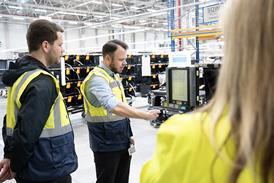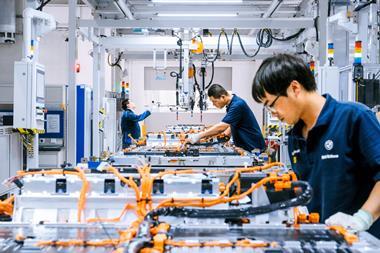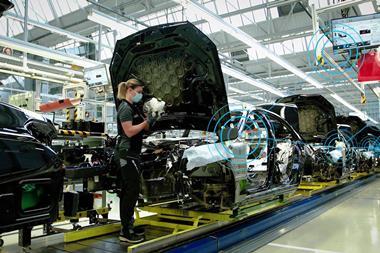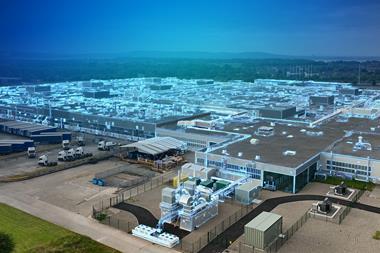
SSAB and its partner IFB Automotive are at the forefront of the rollout of high-strength steel in automotive production, writes technology journalist Håkan Johansson
 SSAB is a leading manufacturer of advanced high-strength steel and the company’s products have played an important part in the improved safety performance of modern cars. But so far, safety has not been a driving force for increased use of high-strength steel in India. Nonetheless, recent trends in the Indian market suggest that this situation is changing. And at the forefront of this increased focus on safety is IFB Automotive, part of the IFB Industries Ltd group of companies.
SSAB is a leading manufacturer of advanced high-strength steel and the company’s products have played an important part in the improved safety performance of modern cars. But so far, safety has not been a driving force for increased use of high-strength steel in India. Nonetheless, recent trends in the Indian market suggest that this situation is changing. And at the forefront of this increased focus on safety is IFB Automotive, part of the IFB Industries Ltd group of companies.
The group was established 41 years ago in Kolkata. Its core business back then was the manufacture of fine-blanking components and related machine tools such as straighteners, decoilers and strip loaders. The company has grown over the course of the last 25 years and is today a leading provider of parts and solutions to the automotive industry. “Our customers are primarily OEMs in India and other countries, and a growing part of our production consist of parts made from advanced high-strength steel,” says Ajay Wani, the general manager responsible for R&D with IFB Group’s automotive division.
The first steps
The first application that IFB Automotive found for high-strength steel was in the manufacture of a seat slider, a part that needs to be very strong in an accident. IFB Automotive’s experiences from this initial trial were highly positive. In fact, it is very much part of the company’s vision for it to be the first port of call for safety and comfort-related products among vehicle manufacturers.
“Over the years, we have built a reputation as a leading provider of similar and related products in the automotive sector. High-strength steel helps us to build on that position in the market,” Mr Wani says.
“In our market, I would say that it is particularly important to reduce weight and we have been using advanced high-strength steel for a number of years. In our experience, thanks to the launch of several products for various OEM companies, we have managed to reduce weight significantly by using high-strength Docol 800 DP steel rather than conventional steel.”
Nonetheless, Indian car manufacturers can expect to see higher safety standards coming down the road soon. “We are prepared for that,” counters Mr Wani. “Not only will there be national safety regulations for the automotive sector, we will also have to match new demands from our customers. They manufacture cars for all markets and must meet safety requirements such as Global NCAP.”

IFB Automotive has always had a strong focus on R&D and technical development. Building on the skills that are needed to accomplish fine-blanking methodology, the company’s engineers today have all the know-how necessary to increase the use of advanced high-strength steel in their products.
“We have a state of the art R&D centre in Bangalore that is fully equipped to accept turnkey assignments that range from the development of new designs through to carrying out testing and validation in order to meet the exacting demands of our global customers” says Mr Wani. “Here, the concepts emerging from our research into user needs is translating into tomorrow’s innovative products.”
As an experienced steel producer that exists to satisfy the needs of a demanding automotive industry, SSAB has looked beyond providing its customers with information about its products. Instead, the company can boast of a global network of technical engineers that can offer support to users of its steel products.
Together, SSAB’s engineers and its customers can explore technical issues and work together to arrive at new solutions. IFB Automotive is satisfied not only with SSAB’s high-strength steel products, but also with the level of technical support that it receives from its supplier.
“We appreciate SSAB experts’ visits to IFB on a regular basis,” says Mr Wani. “Our engineers keep up-to-date on the latest developments and research at SSAB through technical seminars organised by SSAB experts.” Indeed, IFB Automotive has enjoyed a rewarding partnership with SSAB in its efforts to increase the rollout of high-strength steel across its production. As high-strength steel consumption grows, SSAB will further evaluate various logistic and distribution options to support shorter lead times.
 Ajay Wani, general manager responsible for R&D, IFB Automotive
Ajay Wani, general manager responsible for R&D, IFB AutomotiveMr Wani also points to the challenges IFB Automotive faced when it first started to manufacture parts from high-strength steel. Those challenges, he explains, lay primarily with the formability of the steel and with the need to achieve the desired tolerances.
He says: “The weight savings that can be achieved through the use of advanced high-strength steel come about because you can use thinner material while retaining the same strength. It is, however, seldom an option to change steel grade without making adjustments in production.”
During initial development of tooling for high-strength material, Mr Wani goes on to note, the tool/part supplier faced formability issues, which in turn led to inconsistent tolerances within parts. “We had to revise the tooling after our initial trial runs and included additional forming stages in the revised tool in order to help achieve consistency with the required dimensions,” he explains.
Indeed, it is in circumstances such as these that IFB Automotive believes it can benefit from SSAB’s long track record in forming methods and the application of advanced high-strength steel. “We are sure that SSAB can provide us with technical support when we develop new tools for our production lines. That way we could reduce the number of tool trials and other difficulties in that process,” says Mr Wani.
Safety-critical application
One application that IFB Automotive has found for Docol 800 DP is in the manufacture of safety-critical components for car seats. Docol 800 DP is an advanced high-strength steel that manufacturers around the world have used to improve safety performance in new car models.
Meanwhile, IFB Automotive has also found other applications for advanced high-strength steel. One such application is in the manufacture of seat rails, a component that IFB automotive produces for a number of OEMs in India. And Mr Wani is quick to point out that there might be many other opportunities to use both Docol 800 DP and Docol 980 DP material in seat frames once Indian automotive safety requirements adopt global standards in the future.
“The use of Docol 800 DP and Docol 980 DP in a range of seat-mechanism components helps us to achieve the aggressive weight targets set by automotive OEMs for new products,” he says. And nor does the scope for rolling out advanced high-strength steel end there. “We could probably increase the usage of high-strength steel in various applications,” adds Mr Wani, “if various thickness grades were available domestically through local distribution centres.”
The trend in the automotive industry today is toward a dramatically increased use of advanced high-strength steel. This is based not only on considerations such as safety and comfort, but also on environmental factors such as weight reduction. So whether it comes back to fuel consumption, greenhouse emissions or end-of-life recycling, the weight reductions afforded by advanced high-strength steel can be part of any solution.
An example of one such solution is the Future Steel Vehicle project, which recently unveiled a new concept car to the market. The designers and engineers on this project used the vehicle to demonstrate that it is possible to achieve a weight saving of 35% in a car body by using a large quantity of high-strength steel. IFB Automotive is ready for that trend.


































